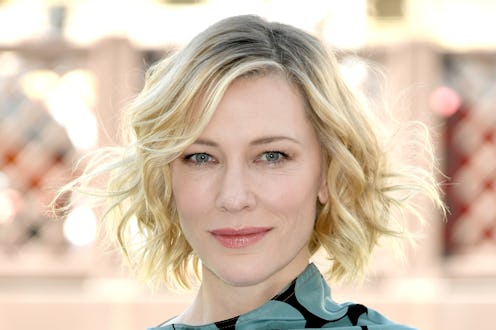Entertainment
Cate Blanchett Turning Down A Movie Role Over Equal Pay Is A Lesson In Knowing Your Worth

Cate Blanchett is a two-time Oscar winner who knows what she's worth. In a long-ranging new interview with Variety, Blanchett talked about Hollywood's gender pay gap, as well as the #MeToo movement and how women's roles in the entertainment industry might be changing for the better. During the interview, she revealed that despite her long track record as a critically acclaimed actor in award-winning movies (Carol, Blue Jasmine), as well as her turns in major blockbusters (Thor: Ragnarok, Lord of the Rings: The Fellowship of the Ring), Blanchett is still sometimes not offered the same amount as her male co-lead — and she is not having it anymore.
Blanchett told Variety that she still faces pay discrimination and offered an anecdote about a movie offer she recently turned down. She explained,
"There was a project I passed on recently, and I said, 'I’m really sorry, but I know what the poster is going to be.' I knew from the get-go what the metaphorical poster image would be — me, shoulder to shoulder, font size to font size with my fellow actor, and consequently I knew what my worth was in the so-called creative equation."
She added that though she thought it would have been a "fun" opportunity, she could not let it go that her male co-lead was being offered a bigger pay day. "If I was being 'sold' as a commodity of equal value to my male counterpart and worked as hard as him, I couldn’t reconcile why I wasn’t being remunerated equally," she said. "They wouldn’t budge. So I did not do it."
The pay gap between male and female stars in Hollywood has been a well-documented issue — in 2015, the gap was even larger (in some cases much larger) than the national average of employed women making 78 cents to every dollar earned by a man in the same job. Just recently, Claire Foy made headlines when it was revealed that she made less money than Matt Smith on The Crown, despite her role as the Queen of England. That's not all: Women of color in the industry make even less, being paid on average only a fraction of what their white counterparts make.
Jennifer Lawrence was one of the first major actors to talk about the issue when she wrote an essay for Lena Dunham's newsletter in 2015. At the time, Lawrence received a lot of praise from other women, but also some backlash from people who argued that, as one of the highest paid women in Hollywood, she shouldn't be complaining.
Blanchett noticed that criticism and addressed it head-on in her Variety interview. She claimed that Lawrence was "immediately attacked for her hubris and greed," because she was a "financially secure actress," but the issue goes deeper than adding money and jewels to their massive bank vaults. Blanchett said,
"If an actor is making a profound and pivotal contribution, then they should be remunerated accordingly. And when that remuneration is different, purely because of your gender, that’s just ridiculous. It’s a marker of how much you’re creatively valued within the equation. You want to be valued for your work."
In turn, Blanchett is helping other women in Hollywood by speaking out about the issue. As her fellow The Curious Case of Benjamin Button actor Taraji P. Henson pointed out last year, for women who do not get as many opportunities as Blanchett (who made considerably more in the aforementioned movie), particularly women of color, it's hard to fight for that higher pay. Additionally, women who are just starting out in their careers, or who don't have as much name-recognition, will be passed over if they try to argue for better pay for another woman who will accept the lower check amount.
Though Blanchett did lose this part, she is not hurting for opportunities. In 2018 alone, she has four movies coming out, including the all-women Ocean's Eleven movie Ocean's 8 and the title role in Where'd You Go, Bernadette. She can afford to skip a movie to make a stand for better pay. Hopefully more women in her position will follow suit.